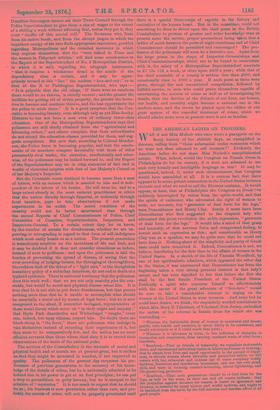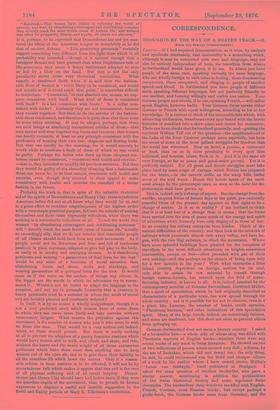W THE AMERICAN LADIES ON TROUSERS. AS it not Miss Muloch
who once wrote a panegyric on the fleecy hosiery of her childish days, as exemplified in drawers, calling them "those substantial under-vestments which we were not then ashamed to call trousers ?" Evidently the
American ladies do not share Miss Muloch's unsophisticated nature. What, indeed, would the Congress on Female Dress in Philadelphia do for its oratory, if it were not ashamed to use would have assembled at all. It is a curious fact that there appears to be some potent connection in the United States between rhetoric and what we used to call the Bloomer costume. It would
appear, at least, that at Philadelphia the Congress on Dress-7as suddenly interrupted by voices from the spirit-world, and that the spirits of eminence who advocated the right of women to wear, not trousers, but " garments of dual form for the legs," were Demosthenes and Henry Clay. Surely it must have been Demosthenes who first suggested to the eloquent lady who
advocated this great revolution the noble expression, " garments of dual form for the legs." It would take a mind of that grasp and intensity, of that nervous force and compressed feeling, to
invent such an expression as this ; and considerable as Henry Clay was as a speaker, we may be quite sure that he could not have done it. Nothing short of the simplicity and purity of Greek taste could have conceived it. Indeed, Demosthenes is not, we believe, interfering for the first time in the affairs of women in the United States. In a sketch of the life of Victoria Woodhull, by one of her spiritualistic admirers, which appeared the other day in the States, it was announced that Demosthenes has from the beginning taken a very strong personal interest in that lady's career, and has even signified to her that before she dies she shall be the first female President of the United States.
Evidently a spirit who concerns himself so affectionately with the career of the great advocate of " free-love " would be sure to take a considerable interest in urging on the women of the United States to wear trousers. And none but he could have drawn, we think, the exquisitely worded resolutions in
which Mrs. Mary E. Tillottson, of Vineland, New Jersey, embodied the nature of the reforms in female dress for which she was contending :— " Whereas tho fashionable dress of women is unnatural and incom- patible with health and exorcise, is never likely to be consistent, and would not remain so if it could reach that point ;
"Whereas it is inhuman in form, in the infliction of obstacles to locomotion and respiration, thus causing constant waste of vital force ; therofore,
" Resolved,—That as friends of humanity, we repudiate fashionable dress, and recommend individual choice in fabrics and forms of clothing; that to obtain true lives and equal opportunity in the pursuit of happi- ness, to elevate woman above slavorios and pernicious habits, we will reason with her, admonish and entreat her to cease accepting bodily burdens, licentious and murderous inventions, and use her own mind, skill, and taste in forming comfort-favouring, labour-lightening, and life-preserving garments. " Resolved,—Tbat such garmenture should be of dual form for the legs, as well as the arms, as their use and all reason indicate ; that the prejudice against trousers for women is based on ignorance and tyranny, is fostered by many vicious and sordid motives, and ought to be banished from the earth by the full sanction and fearless effort of all good people. " Resolved,—That women have duties in relieving the world of poverty, and that, by abandoning extravagant and debilitating costume, they directly reach the most fertile cause of human ills ; and without this effort for prosperity, liberty, and equity, all others are abortive."
It is, perhaps, to be regretted that Demosthenes has not yet mas-
tered the idiom of the American tongue as completely as he did that of ancient Athens. " Life-preserving garments " certainly suggest something very different from the light dress which in all probability was intended,—though it is natural enough that a foreigner should not have guessed that when Englishmen talk of life-preservers, they mean a heavy instrument adapted to stun or kill by a blow on the head. But that is not the only peculiarity about these very rhetorical resolutions. What exactly is shadowed forth when it is said that the fashion- able dress of women is " never likely to be consistent, and would not remain so if it could reach that point," is somewhat difficult to conjecture. " Consistent," in that absolute use, means, we sup- pose, consistent with itself. What kind of dress is consistent with itself ? Is a hat consistent with boots ? Is a collar con- sistent with socks? Certainly they are not inconsistent, because they consist together. But then, so do the articles of the fashion- able dress condemned, and therefore it is quite clear that there must be some other meaning. It may be alleged, perhaps, that there are such things as absolutely inconsistent articles of dress,—that men cannot well wear together top-boots and trousers ; that women can hardly reconcile, at least on any principle consistent with the profession of wearing their own hair, chignons and flowing locks. But that can hardly be the meaning, for it would scarcely be worth while to condemn a fault of dress of which no one could be guilty. Perhaps the ladies who drew up these eloquent sen- tences meant by consistent, " consistent with health and exercise,' —that is, they intended to amplify the previous sentence. But then they would be guilty of the absurdity of saying that a fashionable dress can never be, or at least remain, consistent with health and exercise, even though they succeed in their appeal to make consistency with health and exercise the standard of a better fashion-in the future.
Probably the truth is, that in spite of the valuable rhetorical aid of the spirits of Demosthenes and Henry Clay, these injudicious American ladies did not at all know what they would be at, and in a great effort to combine magniloquence of the highest order with a very simple practical purpose, fell into the mistake of making themselves and their cause supremely ridiculous, when there was nothing in it intrinsically ridiculous at all. To tell the world that women " by abandoning extravagant and debilitating costumes " will " directly reach the most fertile cause of human ills," is really so exceedingly silly, that we do not wonder that reasonable people of all classes should hold back from any .such movement. As if people could not be licentious and false and full of loathsome passions in plain costumes, adapted to give full play to the body, as easily as in tawdry and cramping dresses. As if abandoning petticoats and wearing " a garmenture of dual form for the legs " would be any more of a fountain of moral salvation than abandoning boots and shoes, socks and stockings, and wearing garmenture of a quinqual form for the toes. It would seem as if the more on the surface of things any reform is, the bigger are the words in which its advocates try to recom- mend it. Would it not be better to adapt the language to the occasion, and not try to persuade humanity that a creature in heavy petticoats must be a monster in whom the seeds of moral evil are lavishly planted and constantly watered ?
In itself, it is by no means a wholly insignificant, though it is not a very profound need, which women have of some dress in which they can move more freely and take exercise without unnecessary fatigue. What creates the prejudice against this movement, is the number of women who join it who seem to wish to dress like men. That would be a very serious evil indeed, which no State should permit. But there is really nothing at all to prevent the adoption of a pretty feminine costume which would leave women able to walk, and climb, and skate, and ride, without the heavy and the weary weight of all those extraneous petticoats which have done more than anything else to keep women out of the open air, and so to give them their liability to all the countless ills which beset the nerves. Only if a reason- able reform in these matters is to be effected, it will not be by mountainous talk which makes it appear that this evil is the root of all physical suffering and of all moral iniquity. Demos- thenes and Henry Clay should have had better taste, if they were the guardian angels of the movement, than to permit its human exponents to disgrace a useful and humble suggestion in the florid and flighty periods of Mary E. Tillottson's resolutions.































 Previous page
Previous page